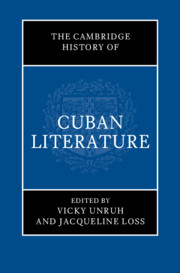Book contents
- The Cambridge History of Cuban Literature
- The Cambridge History of Cuban Literature
- Copyright page
- Dedication
- Contents
- Figures
- Contributors
- Acknowledgments
- Introduction Unfinished Histories
- Part I Literature in the Early Colony
- Part II Cuban Literature’s Long Nineteenth Century
- Part III Literary and Intellectual Culture in the Twentieth-Century Republic
- Part IV The Revolution’s Literary-Cultural Initiatives and Their Early Discontents
- 22 Beginnings
- 23 Imagining Cuba’s New Revolutionary Communities Through Film (1959–1989)
- 24 Shaping New Cultural Literacies
- 25 The Social Life of Music in Cuban Literary Culture
- 26 Casa de las Américas and Revolutionary Configurations of Latinoamericanismo
- 27 The Travels of Fiction in the Cuban Diaspora
- 28 Cuba’s Poetic Imaginary (1959–1989)
- 29 The Artistic Worlds of Guillermo Cabrera Infante
- 30 The Diasporic Odysseys of Reinaldo Arenas and His Writings
- Part V Cuba and Its Diasporas into the New Millennium
- Epilogue
- Select Bibliography
- Index
- References
22 - Beginnings
Testimonios, Experimentalism, and Their Legacies
from Part IV - The Revolution’s Literary-Cultural Initiatives and Their Early Discontents
Published online by Cambridge University Press: 31 August 2024
- The Cambridge History of Cuban Literature
- The Cambridge History of Cuban Literature
- Copyright page
- Dedication
- Contents
- Figures
- Contributors
- Acknowledgments
- Introduction Unfinished Histories
- Part I Literature in the Early Colony
- Part II Cuban Literature’s Long Nineteenth Century
- Part III Literary and Intellectual Culture in the Twentieth-Century Republic
- Part IV The Revolution’s Literary-Cultural Initiatives and Their Early Discontents
- 22 Beginnings
- 23 Imagining Cuba’s New Revolutionary Communities Through Film (1959–1989)
- 24 Shaping New Cultural Literacies
- 25 The Social Life of Music in Cuban Literary Culture
- 26 Casa de las Américas and Revolutionary Configurations of Latinoamericanismo
- 27 The Travels of Fiction in the Cuban Diaspora
- 28 Cuba’s Poetic Imaginary (1959–1989)
- 29 The Artistic Worlds of Guillermo Cabrera Infante
- 30 The Diasporic Odysseys of Reinaldo Arenas and His Writings
- Part V Cuba and Its Diasporas into the New Millennium
- Epilogue
- Select Bibliography
- Index
- References
Summary
This chapter addresses the developments in literary and intellectual culture following the 1959 triumph of the Cuban Revolution, including the complex debates about the relationship between form and content that featured in the literature and the literary landscape of the new revolutionary society. Outlining the national and international contexts in which cultural policy was being developed and implemented, and within and against which individual and grouped actors, discourses, and texts were contributing to a heterogeneous understanding of literature in the revolution, the chapter underscores the relationship in the 1960s and 1970s among literature, cultural trends, processes of legitimization, political actions, and newly founded state institutions. In this context, the chapter then investigates how intermedial creations – and,m more specifically, the testimonio, a genre portrayed as a “radical anticolonial and decolonizing experiment” – negotiate individual agency and collective identity.
Keywords
- Type
- Chapter
- Information
- The Cambridge History of Cuban Literature , pp. 353 - 367Publisher: Cambridge University PressPrint publication year: 2024

